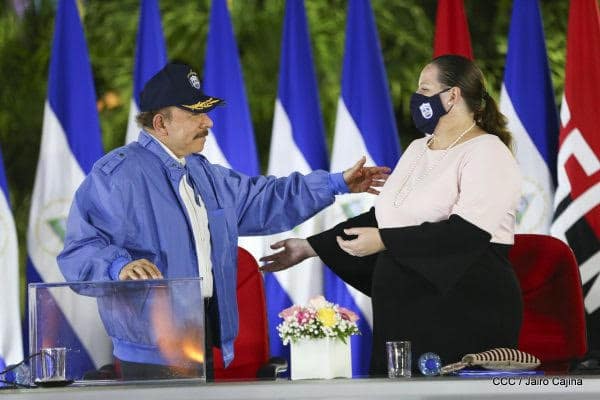31 de octubre 2020

Children of Exile: The Births “Sowing Hope” in the Camp of Nicaraguan Farmers

PUBLICIDAD 1M
PUBLICIDAD 4D
PUBLICIDAD 5D
Nicaraguan Platform of NGO Networks will file an appeal of unconstitutionality of the Law for the Regulation of Foreign Agents

Nicaraguan Platform of NGO Networks will file an appeal of unconstitutionality of the Law for the Regulation of Foreign Agents
One hundred non-governmental organizations and six networks that constitute the Nicaragua Platform of NGO Networks, will file an appeal against the Foreign Agents Law. The organizations claim the law is unconstitutional. It obliges those who receive international funds to register with the Ministry of the Interior as “foreign agents.” According to a statement in which they present their rejection of this law, no members of the Platform will register.
Amaru Ruiz, of the “Fundacion del Rio” and the NGO platform spoke to the Esta Noche program on the issue. He said filing an appeal “gives us legal protection that allows us to refuse to register.”
According to Ruiz, they will continue using the legal channels despite knowing that it will not prosper. Such occurred with appeals lodged by the NGOs confiscated and closed in the last three years. However, he explained that three organizations will introduced the case before the Inter-American Court of Human Rights (IACHR).
“Let us remember that in a democratic society, one of the fundamental pillars, is the participation of civil society organizations,” he stressed.
Prior to the law’s approval, the Nicaraguan Platform of NGO Networks had a converse with several international organizations who are in the country. They were extremely concerned because people who work for them in Nicaragua would have to register as “foreign agents.”
“What’s going to be affected are development projects and programs promoted by non-governmental organizations. These organizations work to improve the quality of life of vulnerable communities, groups and populations,” notes Ruiz.
Likewise, he points out that many NGOs believe that, after the approval of the law and the possible reduction of foreign aid workers, they will have to reduce their level of activities and in the worst case close down.
“This is not the first time that we have arbitrary measures with the closure of cooperation. We remember it with organizations like UNDP. Now what the regime is doing is institutionalizing it by law. This has other implications. Cooperation and other organizations may decide to leave the country because there are no conditions to work,” says Ruiz. The environmental activist had to go into exile since 2018.
Currently in the country there are 7,222 non-governmental organization that implement development, education, human rights and other development projects in vulnerable sectors. Several comprehensive care centers that are linked to one of these organizations have been closed in recent weeks. This situation could get worse.
“We have told them about our experience as an organization and of the nine organizations that we closed (in 2018). As such, we have also encouraged them that it is not only possible to work with legal status. We believe that many of the causes defined by these organizations and the right to freedom of association should prevail. They must continue to fight for the mission and vision that their organizations have,” he said.
Ruiz said there are a of 7,222 organizations registered in the country. He noted that half are linked to protestant churches and these will not be affected by the foreign agent law. They fall under a classification whereby the law excludes them. Therefore, the rest of the organizations are those that are already evaluating what options there are to continue operating.
“The other organizations are proposing low-profile strategies. Working under some conditions typical of the type of government. Some organizations are talking and negotiating with the regime itself. Meanwhile, a good part of the half that remains are defining actions to encourage more organizations join in requesting the unconstitutionality appeal,” he says.
Likewise, Ruiz points out that in addition to the approval of this law, the regime is preparing an entire apparatus to stop the work of the NGOs. “Even though you do not register, there are other mechanisms linked to the banks. The banks are acting as accomplices for the illegal and unconstitutional abuses by the Government.”
The platform of civil society organizations is also demanding explanations from the Ministry of the Interior. How will the organizations operate, which have 50 days to register as of today? According to this law they cannot make any movement of financial resources or material goods? Or is it that this law is about its discretionary application to certain organizations?
PUBLICIDAD 3M
Confidencial es un diario digital nicaragüense, de formato multimedia, fundado por Carlos F. Chamorro en junio de 1996.
PUBLICIDAD 3D